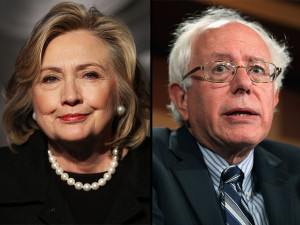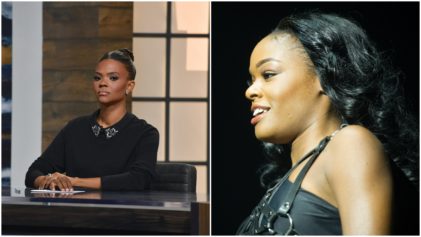With the Iowa Caucus behind us, Hillary Clinton won a marginal victory, which means she will share Iowa’s delegates in a virtual tie with Bernie Sanders, who has lots of money, lots of time to play out this primary season and who goes into New Hampshire as the favorite. Neither of these mostly white states are of much consequence to the Black voter, but the dynamics that are developing among the Democratic Party rivals are significant. On the one hand, Clinton was expected to win the nomination with ease, until Sanders came along. The Black vote will determine who gets the nomination. The question that remains is, will Black people continue to provide their unwavering support to the party, or will they make the candidates hustle for their support? And exactly what would it look like to make politicians earn Black votes?
On the one hand we have Hillary Clinton, who is the clear favorite among African-Americans. As a number of commentators have noted, this would appear to be a paradox, given the Clintons’ rise to power was based on throwing Black folks under the bus. As Corey Robin points out in Salon, for those political analysts, observers and pundits who were around in the 1990s, Hillary and Bill Clinton conjure up images of welfare reform and the Omnibus crime bill, both of which were punishment for Black people. Then there was Bill Clinton’s repudiation of Black rapper and activist Sister Souljah, comparing her to KKK leader David Duke for her comments on Black-on-white racial violence during the 1992 Los Angeles riots. And there was his decision to return to Arkansas to oversee the execution of Ricky Ray Rector, a mentally ill man who saved the dessert of his last meal for later.
“And beyond — really, behind — all that, the desperate desire to win over white voters by declaring to the American electorate: We are not the Party of Jesse Jackson, we are not the Rainbow Coalition,” Robin wrote.
Hillary Clinton has received criticism for her recent statements regarding Lincoln, seeming to placate white voters with a wink and a nod of historical revisionism when she suggested, “Lincoln was willing to reconcile and forgive” and the country “might have been a little less rancorous, a little more forgiving and tolerant, that might possibly have brought people back together more quickly.” She added, “Instead, you know, we had Reconstruction, we had the re-instigation of segregation and Jim Crow. We had people in the South feeling totally discouraged and defiant. So, I really do believe he could have very well put us on a different path.”
Amanda Girard promotes this line of reasoning in U.S. Uncut, arguing that the Clintons based their legacy on white supremacy, while positioning themselves as the champions of Black people. As Arkansas governor, she notes, Bill Clinton did not oppose Confederate Flag Day, which honors the Confederacy. Further, while he was president, the 1992 Democratic Party platform made no mention of racial injustice for the first time in half a century. As Girard argues, federal and state prisoners increased 673,000.
And citing Michelle Alexander, law professor and author of The New Jim Crow, federal funding for public housing dropped $17 billion, while money to prisons jumped $19 billion and $1 billion in state spending was redirected from higher education to prison construction. Alexander broke it down in a Facebook post:
If anyone doubts that the mainstream media fails to tell the truth about our political system (and its true winners and losers), the spectacle of large majorities of black folks supporting Hillary Clinton in the primary races ought to be proof enough. I can’t believe Hillary would be coasting into the primaries with her current margin of black support if most people knew how much damage the Clintons have done — the millions of families that were destroyed the last time they were in the White House thanks to their boastful embrace of the mass incarceration machine and their total capitulation to the right-wing narrative on race, crime, welfare and taxes. There’s so much more to say on this topic and it’s a shame that more people aren’t saying it. I think it’s time we have that conversation.
To smooth things over for his wife’s presidential candidacy, Bill Clinton apologized for his role in mass incarceration at the NAACP convention. But is that enough?
Meanwhile, Bernie Sanders, the socialist senator from Vermont who also supported the Clinton crime bill, would hope to peel off some of Clinton’s support among African-Americans. As The New York Times reported, Sanders at one point was dismissed as a leftist fringe candidate. But with over $28 million in cash to Clinton’s $38 million, the contest is by no means over. In Iowa, Sanders performed well among younger voters and independents, while Clinton scored among moderates, women and older voters, gained points for tacking to the left on trade, the environment and gay rights, but losing some ground for her Wall Street ties and political pragmatism.
Writing in the Washington Post, Paul Waldman predicts that the Black vote could spell doom for Sanders unless he finds a way to win over large numbers. Clinton has years of African-American support behind her, Waldman argues, and has been able to portray Sanders as insufficiently loyal to President Obama. Meanwhile, Sanders does well among white liberals and progressives. However, the only states where white liberals constitute a larger share of the primary vote are Iowa, New Hampshire and Vermont. After that, Blacks make up a much higher proportion of the vote. Waldman says the key to winning the Black vote is not “about hopes and dreams” but “nuts and bolts: the social networks, the key endorsers and officials, the neighborhood institutions, the systems that have been built up in the most trying circumstances to get people to the polls.” He adds that “you can’t blow into town a week before election day with a bunch of eager white 20-something volunteers from somewhere else and win their votes.”
Sanders — who, like Clinton, has been taken to the woodshed by #BlackLivesMatter activists — hired a Black woman activist as his national press secretary, and has received support from Cornel West; former Ohio lawmaker Nina Turner; the daughter of police brutality victim Eric Garner; and a number of Black South Carolina lawmakers. Further, Sanders may have undermined his efforts to help build and consolidate his base of Black support when he unequivocally came out against slavery reparations, arguing that it would not pass through Congress, and offered economic policies to help African-Americans instead. Although Clinton may agree with Sanders, she was wise enough not to mirror his answer, giving a more nuanced — however noncommittal — response to the issue of reparations.
Jonathan Capehart of the Washington Post issues a warning to Democrats in the midst of the Clinton-Sanders race. He says that if a Republican president is elected, Democrats would only have themselves to blame. Democrats lost the House and Senate in 2010 and 2014, respectively, because voters of color and white progressives did not go to the polls — not because working-class whites fled the party. Capehart invokes Steve Phillips of the Center for American Progress, who says Democrats need to shift their emphasis from winning white swing voters to capturing the “New American Majority,” a 51 percent share made up of 23 percent voters of color and 28 percent white progressives. This translates to 81 percent people of color and 38 percent of whites, according to Phillips. When this majority is not given a reason to vote — including Blacks, who in the Obama era had a voter participation rate surpassing whites — the consequences are clear.
“But the mutual bitterness that emerged in the final days leading up to the Iowa caucuses must not blind Democrats to their need to vote no matter who their nominee is in November,” Capehart wrote.
Meanwhile, rapper Azealia Banks just might have the last word. Banks said she might as well vote for Donald Trump, saying that since the country is “full of sh*t,” we might as well “put a piece of sh*t in the White House.”
Just because Hilary Clinton and Bernie sanders say nice things about minorities doesn’t mean they actually mean them
— azealiabanks (@AZEALIABANKS) February 1, 2016
Politicians have been saying “nice” things about colored folks and we’ve still been getting fucked.
— azealiabanks (@AZEALIABANKS) February 1, 2016
“I have no hope for America,” Banks added. “It is what it is. Capitalist, consumerist, racist land of make believe. [sic] Its inherently evil and must feed on others for it to survive. I didn’t create it. I’m not proud of it. But I am here… And it’s all I know.”
Although her tweets are interestingly timed with the release of her first new song in a year, as the Daily Beast noted, Banks did bring up some worthy points about politicians taking Black people for granted, and questioning whether they really care about us. But will Black voters make them care?



